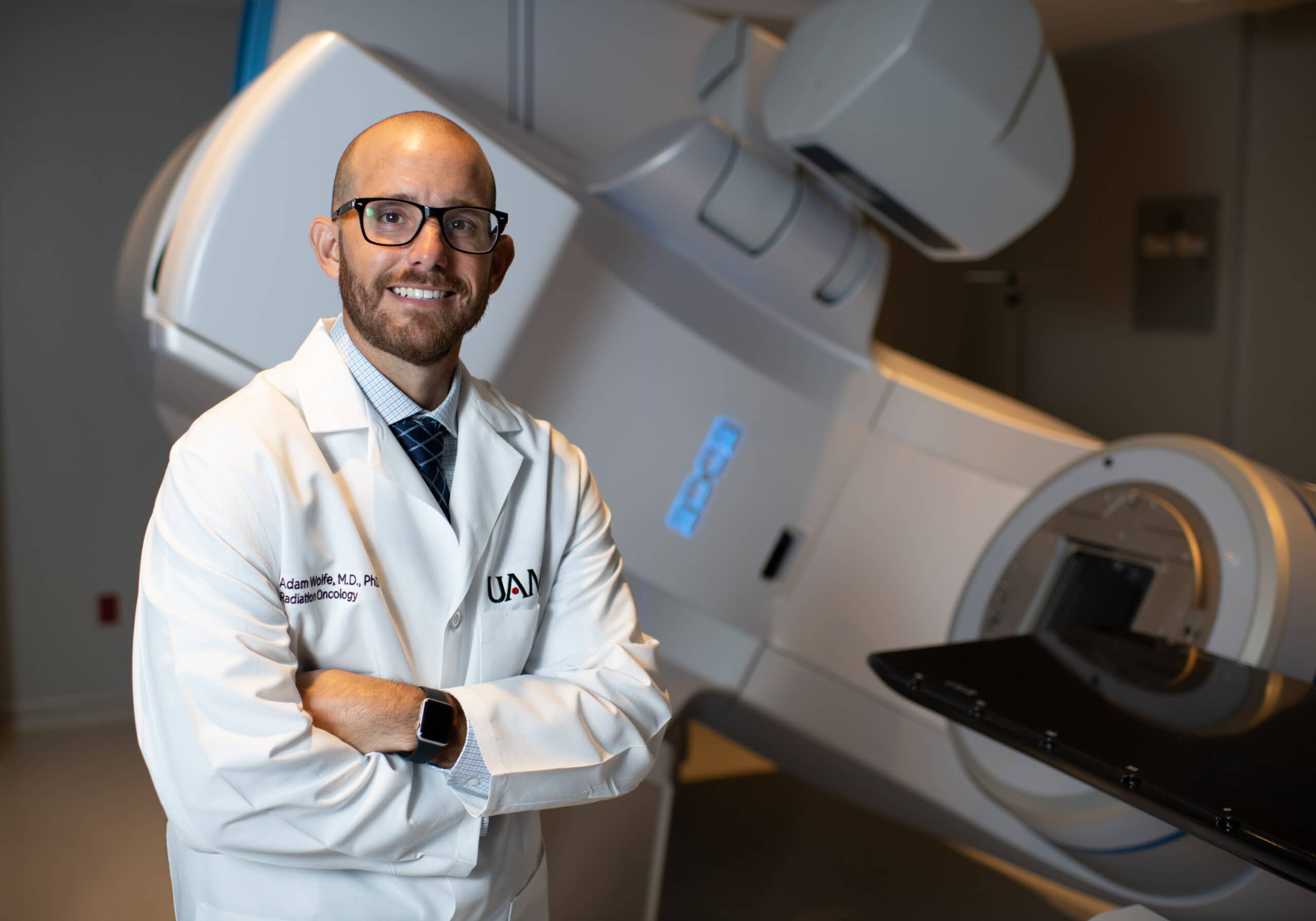View Larger Image

UAMS radiation oncologist and cancer researcher, Adam Wolfe, M.D., Ph.D., is on a mission to help more patients survive pancreatic cancer.
Image by Bryan Clifton
American Cancer Society Funds UAMS Study to Understand Treatment Resistance in Pancreatic Cancer
| Adam Wolfe, M.D., Ph.D., a radiation oncologist at the University of Arkansas for Medical Sciences (UAMS) Winthrop P. Rockefeller Cancer Institute has received a $583,200 grant from the American Cancer Society (ACS) to study radiation resistance in pancreatic cancer, a lethal disease with the highest mortality rate of all cancers.
The four-year ACS Clinician Science Development Grant will fund Wolfe’s study of KRAS, a mutated gene that is present in 90% of all pancreatic cancer cases, and its connection to RAD18, a DNA repair enzyme also highly expressed in pancreatic cancer that prevents radiation from destroying the cancer cells.
In most cancers, radiation, along with chemotherapy, destroys cancer cells that have developed from damaged DNA.
“In pancreatic cancer, these therapies are challenging due to the presence of intrinsic resistance mechanisms from heightened DNA repair — a consequence of the mutated oncogene KRAS,” said Wolfe, an assistant professor in the UAMS Department of Radiation Oncology who has been studying pancreatic cancer since his residency at Ohio State University.
Wolfe has found that blocking the gene USP7 reduces RAD18 expression levels and increases cancer cell death following radiation.
The ACS grant will provide critical funding for Wolfe’s lab at the UAMS Winthrop P. Rockefeller Cancer Institute, where he will continue to study the KRAS-RAD18-USP7 pathway.
“By understanding this cancer-related pathway, we can start to design targeted therapies to inhibit the increased DNA repair after radiation,” said Wolfe. “In a second aim, we will test a novel USP7 inhibitor in a pre-clinical model of pancreatic cancer with radiation to determine if this combination strategy is effective and safe.”
Wolfe hopes the ACS-funded study will identify other biomarkers and targets to reduce the intrinsic repair process prior to radiation without causing increased damage to normal healthy tissue.
“Pancreatic cancer is commonly diagnosed in later stages than other types of cancers, and there are no screening options to catch it early,” said Wolfe. “Patients whose cancer has not spread to other parts of the body still have hope for a cure, but many patients don’t make it through radiation to surgery.
“If we can get more patients to respond to radiation, we can get more patients to surgery, and increase survival rates.”
According to the Centers for Disease Control, pancreatic cancer accounts for only 3% of new cancer diagnoses but has the highest mortality rate. It is the fourth leading cause of cancer deaths in the U.S. for both men and women.
Only 12% of patients live five years after being diagnosed.
The American Cancer Society estimates 50,550 deaths from pancreatic cancer in 2023, including an estimated 460 Arkansans who are expected to die from pancreatic cancer by the end of 2023.
According to the American Society of Clinical Oncology, pancreatic cancer diagnoses are rising overall, and the disease is expected to overtake colorectal cancer as the second highest cause of cancer deaths in the U.S. Wolfe attributes the increase to obesity and Type 2 diabetes, which raise the risk of many cancers, including pancreatic.
“While we’re seeing improved survival for many other cancers, patients with pancreatic cancer have limited treatment options,” said Michael Birrer, M.D., Ph.D., director of the Winthrop P. Rockefeller Cancer Institute. “The only way to change that is by accelerating research.”
“The American Cancer Society recognizes this urgent need,” added Birrer. “They could not have chosen a more talented physician scientist than Dr. Wolfe. He is deeply committed to finding a cure for this vulnerable group of patients.”
Wolfe earned dual medical and doctoral degrees from the Medical Scientist Training Program at the University of Texas McGovern Medical School and MD Anderson Cancer Center Graduate School of Biomedical Sciences. He is a member of the UAMS Winthrop P. Rockefeller Cancer Institute’s Cancer Biology Research Group.
UAMS is the state’s only health sciences university, with colleges of Medicine, Nursing, Pharmacy, Health Professions and Public Health; a graduate school; a hospital; a main campus in Little Rock; a Northwest Arkansas regional campus in Fayetteville; a statewide network of regional campuses; and eight institutes: the Winthrop P. Rockefeller Cancer Institute, Jackson T. Stephens Spine & Neurosciences Institute, Harvey & Bernice Jones Eye Institute, Psychiatric Research Institute, Donald W. Reynolds Institute on Aging, Translational Research Institute, Institute for Digital Health & Innovation and the Institute for Community Health Innovation. UAMS includes UAMS Health, a statewide health system that encompasses all of UAMS’ clinical enterprise. UAMS is the only adult Level 1 trauma center in the state. UAMS has 3,485 students, 915 medical residents and fellows, and seven dental residents. It is the state’s largest public employer with more than 11,000 employees, including 1,200 physicians who provide care to patients at UAMS, its regional campuses, Arkansas Children’s, the VA Medical Center and Baptist Health. Visit www.uams.edu or uamshealth.com. Find us on Facebook, X (formerly Twitter), YouTube or Instagram.###